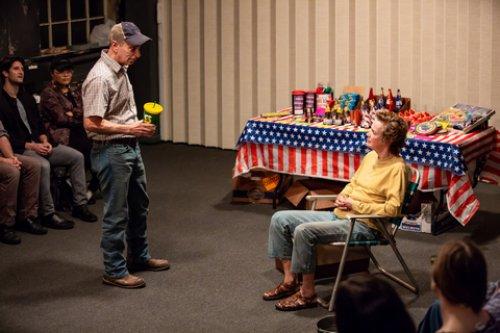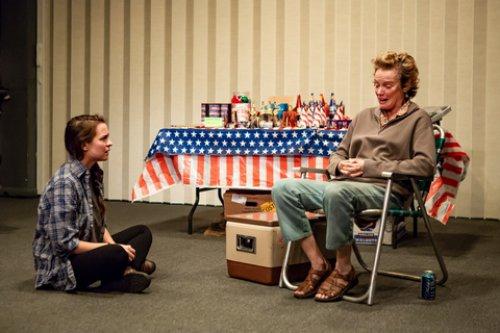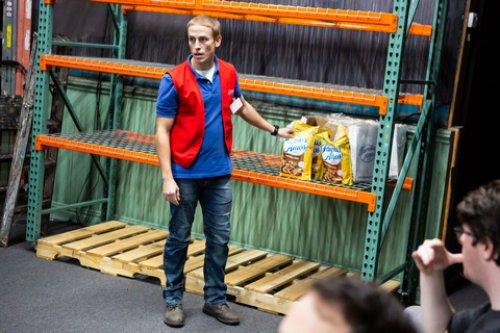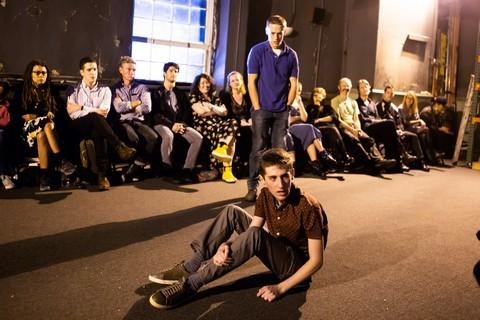Lewiston/Clarkston
A theatrical event: a masterpiece from Idaho theater poet Samuel D. Hunter, a communal dinner, and an intriguing companion play curtain raiser.

Arnie Burton and Kristin Griffith in a scene from Samuel D. Hunter’s “Lewiston/Clarkston” (Photo credit: Jeremy Daniel)
[avatar user=”Victor Gluck” size=”96″ align=”left” ] Victor Gluck, Editor-in-Chief[/avatar]Rattlestick Playwrights Theater is presenting a theatrical event by Idaho theater poet Samuel D. Hunter (The Whale, A Bright New Boise, The Few, Pocatello, The Healing, The Harvest): a long one-act masterpiece (Clarkston), a 40-minute communal dinner served on picnic tables of what the characters would be eating and a curtain raiser, Lewiston, which has the same themes and symbols as the later play. Taken as a whole this is a remarkable achievement, probably the best Hunter has created so far. Director David McCallum must be given some of the credit for this magnificent evening, and in particular actor Edmund Donovan who isn’t so much performing as living his character of Chris in Clarkston.
The first time the two plays have been performed as a double bill after their separate premieres in 2013 and 2016, their resonances become obvious when performed back to back. Both concern distant descendants of Lewis and Clark who travel to the far West to find their heritage. The themes of both are the search for identity, coming to terms with one’s past, and finding one’s lost roots, as well as following the journey of their ancestors. Taken together the plays concern the end of the Old West and each ends on July 4th. If you know the Rattlestick venue on Waverly Place, you immediately notice on entering that the theater has been gutted to its walls and windows and the entire space is utilized for this production.
In the first play, Marnie, a descendant of Meredith Lewis, travels east from Seattle to return to Lewiston, Idaho, where she grew up, just as the last of her family land is about to be sold off. In Clarkston which is the name of the town four miles away on the Washington side of the Snake River, Jake, a descendant of William Clark, travels west from Connecticut to follow his ancestor’s path to the Pacific but he hasn’t made it all of the way. Both twentysomethings are questing for answers and roots. They wonder if the American pioneer experience is over and if there are any adventures left.

Leah Karpel and Kristin Griffith in a scene from Samuel D. Hunter’s “Lewiston/Clarkston” (Photo credit: Jeremy Daniel)
In Lewiston, one day before July 4th, 70ish Alice (Kristin Griffith) is selling fireworks by the roadside on her land outside of town near the Snake River. She is pondering an offer by the new subdivision to be named Meriwether Terrace to sell off the last 20 acres of what was once her great-great grandfather’s cattle ranch started in the 1850’s. She is assisted by her live-in boarder, Connor (Arnie Burton) who pays no rent but helps on the mortgage with his job at the local Walgreens. When 24-year-old Marnie (Leah Karpel) shows up backpacking, neither of them recognize her at first as Alice’s granddaughter she has not seen in 16 years from the time Marnie’s mother committed suicide and Marnie and her father moved away to Tacoma.
Marnie, a vegetarian into green solutions, is both angry and hostile to her grandmother who has not been in touch all these years and furious when she finds that Alice is about to sell off the last of the family land. She offers to give her $30,000 she has just received from selling her own urban farm in Seattle to keep in the family and to turn into a work farm. Marnie also is listening for the first time to tapes that her mother made on her re-creation of the Lewis and Clark journey from Lewiston to the Pacific. The stand-off between Alice and Marnie, with closeted gay Connor caught in the middle, becomes the dramatic problem of the play.
While the unemotional, flat playing of three actors under McCallum’s direction may be accurate to the Idaho temperament, it is rather undramatic. The play never catches fire – even though the characters periodically attempt to light up some minor fireworks. The most interesting character is not questing Marnie but her reticent grandmother Alice about whom we do not learn enough and she remains an enigma. The story reveals much about the end of the West and searching for one’s heritage, but we never care enough about the characters to be rooting for them either way.
Dane Laffrey’s minimalist setting provides little atmosphere while the audience sitting on three sides of the playing area can be seen at all times. The play may, in fact, be much better than the production allows. Evening audiences are treated to a fireworks display in Stacey Derosier’s lighting plot just outside the window which cannot be seen at the matinees due to the afternoon light.

Edmund Donovan in a scene from Samuel D. Hunter’s “Lewiston/Clarkston” (Photo credit: Jeremy Daniel)
In Clarkston, set just across the Snake River on the Washington State side, 22-year-old Jake (Noah Robbins), a distant descendant of William Clark, has recently received news that he has Huntington’s disease and most likely has only eight more years to live. Recently graduated from Bennington College with an impractical major in Post-Colonial Gender Studies, he feels that he will probably never accomplish anything in his short life.
As a result, he has chosen to flee the Connecticut home of his parents and travel to the Pacific on the Lewis and Clark Trail. However, almost having an accident outside of Clarkston, he has taken a hotel room and gotten a job as an overnight stocker in the Costco directly across the street, his first real job. Thinking about all the Costcos across the country and all the employees, he muses as to whether “we’re like the last American pioneers.”
However, like Alice in Lewiston, the main character is not Jake, but Chris (Edmund Donovan), the twentyish overnight stocker assigned to train him. Chris has fled the home of his recovering drug addict mother Tisha (Heidi Armbruster), and has had a difficult time making ends meet, particularly paying for the local college that he has graduated from. He wants to be a writer of fiction but so far has not been published. He is also a closeted gay man in a community where such behavior is frowned upon, unlike the experience of the out Jake whose Connecticut parents have been comfortable with his declaration when he was 15 years old. Periodically, Trisha shows up before or after his work, trying to reestablish contact with Chris but he is reluctant to become involved in her games.
Donovan’s performance is so nuanced and layered as a young man of tremendous potential with a life of limited opportunity that he is heartbreaking even though his Chris is a man of few words. Although it is Jake who is dying, our sympathies go out to Chris as having the fewer choices in life. The developing relationship between these two lonely young men in a community at the end of the world crackles with tension and emotion. An attempted abortive sexual encounter between the young men in the store parking lot has all the drama of a classic ballet. Things come to a crisis when Trisha begins using again and Jake’s illness appears to be worsening. The ending which takes both stories full circle is both satisfying and right.

Edmund Donovan and Noah Robbins in a scene from Samuel D. Hunter’s “Lewiston/Clarkston” (Photo credit: Jeremy Daniel)
The diminutive Robbins as Jake makes a strong contrast to Donovan’s Chris, as a young man who has no self-pity for his problems while Chris, wearing his emotions on his sleeve, is having trouble keeping it all inside. While Armbruster’s Trisha seems a bit artificial, it must be kept in mind that she is a recovering addicted who is always on guard every minute of her life, always acting a role. When she turns nasty and contemptuous of Jake whom she meets in the parking lot, she gets to show her darker side.
With the audience seated on the two long sides of the theater, Laffey’s setting though minimal exactly presents both Costo storage and the parking lot outside. The young men carry packages the length of the space from the loading dock (the actual stage) to metal shelving at the far end. Derosier’s lighting beautifully turns the same space into the outdoor area behind the store. Jessica Wegener Shay’s costumes for both plays are pitch perfect, as is Fitz Patton’s sound design which is often called upon to be an important dramatic element in the two plays.
While Davis McCallum’s production of Clarkston is much more effective than his Lewiston, taken together Samuel D. Hunter’s two plays are ambitious in scope and epic in theme. Lewiston/Clarkston is an unforgettable experience of young people searching for their roots as well as a star to guide them. Ultimately satisfying in a way few plays are, Hunter’s Lewiston/Clarkston will stay with you long after you have left the theater, their characters resonating with you long after they have left the stage.
Lewiston/Clarkston (extended to December 16, 2018)
Rattlestick Theater, 224 Waverly Place, west of Seventh Avenue So., West Village, in Manhattan
For tickets, call 866-811-4111 or visit http://www.rattlestick.org
Running time: three hours and 45 minutes including a 40 minute break (dinner for evening performances – chicken or vegetarian meals, snack for matinees – can be purchased online in advance or bring your own)






Leave a comment